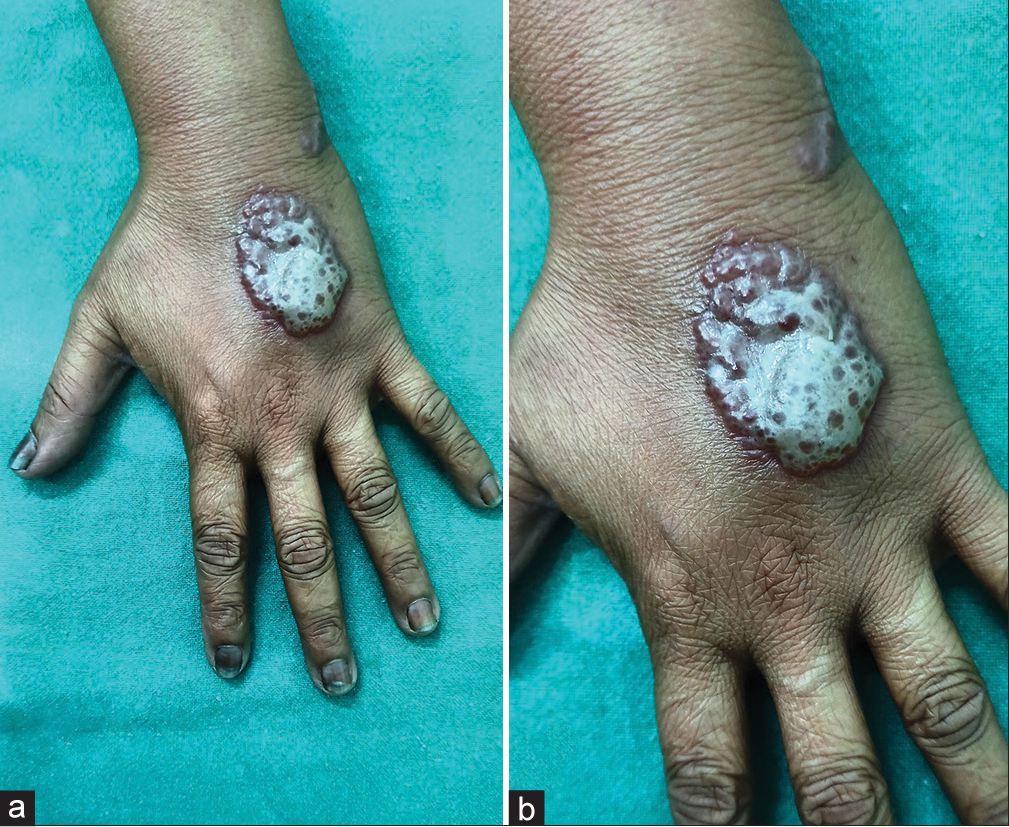Translate this page into:
Docetaxel-induced bullous eruption
*Corresponding author: Fathima Abdul Nazeer, Department of Dermatology, Government Medical College Manjeri, Manjeri, Kerala, India. fathima.seli@gmail.com
-
Received: ,
Accepted: ,
How to cite this article: Nazeer FA, Bhaskaramenon SC, George S, Nazeer MM, Sumitra SN. Docetaxel-induced bullous eruption. J Skin Sex Transm Dis 2024;6:103-4. doi: 10.25259/JSSTD_48_2022.
Forty five-year-old woman who had undergone breast conservation surgery for invasive carcinoma of right breast and who was receiving chemotherapy since 4 months presented with painful vesicles and blisters on the dorsal aspect of left hand of 4 days duration. There were no constitutional symptoms. She had received four cycles of intravenous doxorubicin (90 mg) and intravenous cyclophosphamide (900 mg) followed by three cycles of intravenous docetaxel (140 mg). The chemotherapy was given at an interval of 3 weeks. One week before presentation, she received the 7th cycle of chemotherapy (intravenous docetaxel 140 mg). She was not on any other drug at that time. During infusion of docetaxel, the intravenous cannula had broken, which was removed and a fresh cannula was inserted proximal to the first insertion site. Three days after the infusion, the patient developed a blister on the back of her left hand. Clinical examination showed a multiloculated, tense bulla of size 3 cm × 2 cm, with surface crusting and surrounding erythema on the dorsal aspect of the left hand [Figure 1a], and a few vesicles arranged in a linear fashion, (largest of size 0.5 cm × 0.5 cm) on the dorsomedial aspect of her left wrist [Figure 1b]. Tzanck smear and Gram stain study of the vesicle fluid did not reveal any significant findings. We considered the possibility of docetaxel induced bullous eruption. She responded to saline compresses, cetirizine 10 mg once a day per orally and topical application of fusidic acid cream twice a day for 1 week. Docetaxel extravasation is known to cause erythema, edema, pain, and rarely vesicle formation that manifest days to weeks after the extravasation.

- (a): Multiloculated tense bulla formed at the site of docetaxel extravasation. (b): A closer image of the bulla; a few vesicles are seen proximal to the bulla.
Ethical approval
The Institutional Review Board approval is not required.
Declaration of patient consent
The authors certify that they have obtained all appropriate patient consent.
Conflicts of interest
Dr Sandhya George is on the editorial board of the Journal.
Use of artificial intelligence (AI)-assisted technology for manuscript preparation
The authors confirm that there was no use of artificial intelligence (AI)-assisted technology for assisting in the writing or editing of the manuscript and no images were manipulated using AI.
Financial support and sponsorship
Nil.






